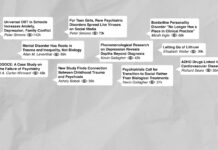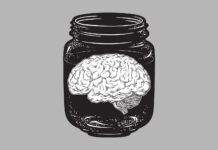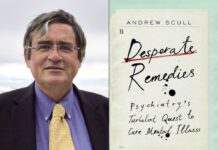Mad in America’s 10 Most Popular Articles in 2023
A roundup of Mad in America's most read blogs and personal stories of 2023 as chosen by our readers.
Polydrugged With 12 Different Drugs… For Insomnia
Before my nightmare with psychiatric medication began, my life was full and happy. But since being prescribed 12 different psychiatric drugs in one year, I have become bedridden, ill and jobless.
Toxic Marketing: The Business of Selling TMS
Ads pushing transcranial magnetic stimulation are everywhere. As someone harmed by the treatment, I believe they are misleading and unethical.
A Revolution Wobbles: Will Norway’s “Medication-Free” Hospital Survive?
We interview Ole Andreas Underland, Director of the Hurdalsjøen Recovery Center in Norway which provides “medication-free” care for those who want such treatment or who want to taper from their psychiatric drugs. Ole Andreas explains why the success of this pioneering approach might threaten its future.
Psychiatry’s Nightmarish 2022 & Its Hysterical Defense Against Criticism
Psychiatry's defenders are open to criticism of psychiatry as long as it stops short of acknowledging the increasingly well-documented reality that psychiatry lacks any scientific merit.
Thomas Szasz Versus the Mental Health Movement
Unbiased experts must examine the claims and research of psychiatry and issue a report as to whether psychiatry not only has a valid medical basis, but whether this basis justifies the widespread violation of medical ethics and the routine use of imprisonment and torture.
Causality in Mental Disturbance: A Review of the Neuroscience
Psychiatry's medicalization of social and psychological suffering is not justified by the currently known biology.
Answering Awais Aftab: When it Comes to Misleading the Public, Who is the Culprit?
The research literature from the WHO, NIMH, and others does not support a narrative of therapeutic progress, of psychiatric treatments that have “continued” to improve over time.
“Never Look on the Dark Side”: The Science of Positivity from Early Eugenics to...
The "science" of happiness has always been inextricably linked to eugenics. Modern positive psychology, with its focus on genetics and willpower, is no different.
Psychiatry’s Cycle of Ignorance and Reinvention: An Interview with Owen Whooley
Ayurdhi Dhar interviews sociologist Owen Whooley about psychiatry's stubborn perseverance in the face of recent DSM embarrassments and the failures of the biomedical model.
“Holy Shit!” Psychiatry’s Cognitive Dissonance on Display
Even those who would seek to reform the profession of psychiatry cannot confront the reality that exists in the research literature
SSRIs, Lindsay Clancy, and Me
Sharing the similarities between Lindsay Clancy's homicidal episode and my own will hopefully help prevent rare SSRI-induced suicides and homicides, including mass shootings.
Anders Sørensen – Tackling Psychiatric Drug Withdrawal Through Research and in Practice
Anders Sørenson is a Danish clinical psychologist with a special interest in psychiatric drug withdrawal. He has undertaken research which assesses the state of guidance on psychiatric drug withdrawal and paid close attention to tapering methods with the aim of identifying approaches which might make withdrawal more tolerable for people.
Inside a Forensic Psychiatry Unit: Here’s How to Survive
Sean Gunderson, who was detained by the criminal justice system for 17 years after receiving an NGRI verdict, documents the life of a forensic psychiatry inmate.
Is Mad in America Doing More Harm Than Good?
A dialogue between Dr. Jim Phelps—a psychiatrist who questions whether MIA is doing more harm than good by reporting the results of long-term trials of psychiatric drugs—and Robert Whitaker, founder of MIA.
Dismissing the “Human Experience”: College Students Feel Unseen by the Medical Model of Mental...
In conversations with college students and recent graduates from across the country and around the world, they described feeling dismissed by views of mental health that narrow their experiences to individual medical problems.
The Parts Within Us: An Interview with Richard Schwartz, Creator of Internal Family Systems
IFS is a different paradigm, which says that rather than being a sign of pathology, it’s the nature of the mind to have “parts." We’re born that way because they're all valuable.
Threatened for Telling the Truth: Polish Journalist Speaks Out
Now I’m under attack, with threats of violence flung at me alongside threats of lawsuits. And all because I shared the large body of peer-reviewed research that contradicts the mainstream assumptions of psychiatry.
Risk of Depression Spikes When Kids Take Ritalin
Risk of depression increased when children were taking methylphenidate for ADHD, but once they stopped taking the drug, depression risk dropped to normal levels.
Andrew Scull—Desperate Remedies: Psychiatry’s Turbulent Quest to Cure Mental Illness
Sociologist and author Andrew Scull discusses the history of psychiatry's "Desperate Remedies," from lobotomy and the asylum to the failures of today's drugs and the fads of ketamine and deep brain stimulation.
White Paper Presents Case Against Forced Treatment
"I see the white paper as the culmination of my 40+ years of advocacy for people subjected to psychiatric incarceration and forced drugging."
David Healy – Polluting Our Internal Environments: The Perils of Polypharmacy
On the MIA Podcast, Dr David Healy discusses World Tapering Day, antidepressant treatment and sensory neuropathy and the difficulties that can be encountered when trying to deprescribe.
Pets More Effective for Grief Support than Humans, Study Finds
A new study explores effective forms of grief support, finding that animals are more effective than humans in providing support.
The Serotonin Zombie: Authors of New Study Try to Breathe New Life into the...
Despite new claims that their study provides "clear evidence" linking serotonin and depression, their data actually supports the opposite conclusion: serotonin levels did not correlate with depression.
State Hospital Memories: More of My Story
The Detroit Free Press did an excellent job in bringing to light the conditions at Pontiac, its loss of accreditation, and closing. Still, they didn't quite grasp the severity of violence there.

































